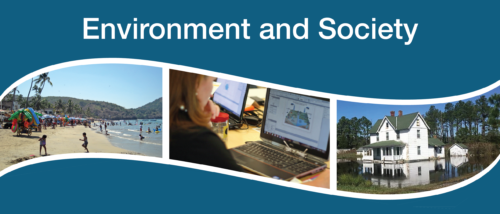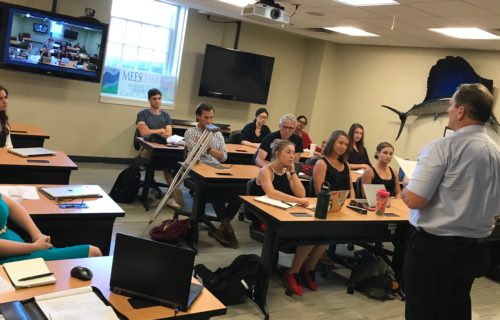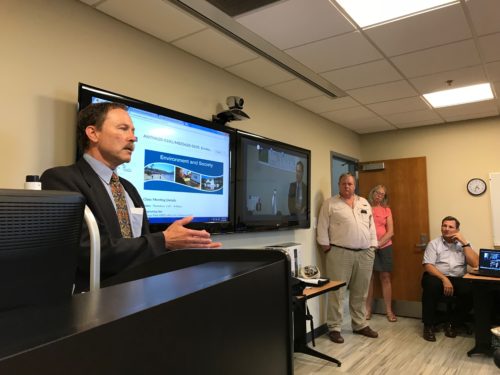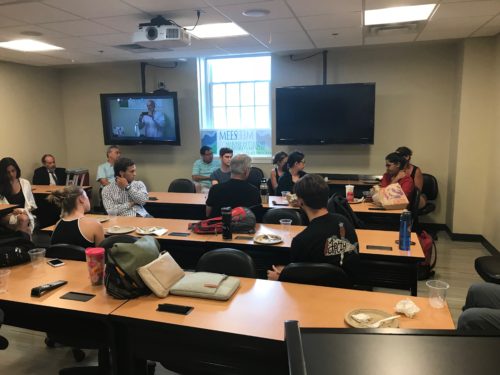New Environment & Society course launched
Bill Dennison · | Learning Science | 3 commentsBy: Bill Dennison
As part of the revised Marine Estuarine Environmental Science (MEES) graduate program curriculum, the Environment & Society foundation launched its foundational course, Environment & Society (MEES 620). The course is being co-taught by Dr. Michael Paolisso (Department of Anthropology, University of Maryland) and Dr. William Dennison (University of Maryland Center for Environmental Science; UMCES). On Aug 30, 2018 we held the first class meeting in person in the MEES office on the University of Maryland College Park campus. Most teaching in the MEES program is done via interactive video networks (e.g., Zoom), but we have found that meeting in person enhances the interactive sessions. We followed the introductory class meeting with a welcome reception for the new foundation, sponsored by the MEES program.

The Environment & Society course has some unique features that embrace the different teaching styles and techniques of the Department of Anthropology and UMCES. For example, using a Department of Anthropology approach, students will be reading papers, chapters, and even books each week which they will synthesize into essays and post ahead of class discussion using the Canvas learning management system. Instructors will review and comment on the essays prior to class time so the class discussions can be based on the readings, the essays, and the questions that arise from the essays. The teaching style that some UMCES classes use (flipped classrooms), in which the lecture material is pre-recorded using Camtasia software and posted on YouTube, is also being employed for some of the lectures to allow more time for class discussion. Over the summer, course instructors also sought out training from representatives at the Teaching & Learning Transformation Center to design this new course.
In the introductory class, we learned that the students have a wide diversity of backgrounds and research interests. There are students from the social sciences and from the natural sciences. There are students from overseas, from all over the United States, and from Maryland. The students are researching oyster aquaculture, carbon, nitrogen, or phosphorus cycling, citizen science, marsh restoration, harmful algal blooms, and a variety of other topics. Some students are full time employees, holding positions both within and outside of the University. This diversity should enhance the learning experience and enrich our discussions.

This semester's course will have a real-world application as it will include a research project based on an ongoing project with the National Park Service. The Integration and Application Network (IAN) of UMCES has partnered with the National Capital Region Network suite of National Parks for over a decade. After completing an intensive assessment of the natural resources for each park over the past ten years, published as Natural Resource Condition Assessments on IAN Press, IAN staff are now working with both cultural and natural resource experts to develop an integrated assessment that encompasses both aspects. This is particularly crucial in the National Capital Region, as these parks arguably need to embrace both cultural and natural aspects more than the large national parks in Western United States and Alaska that mostly focus on natural resources. For example, in the National Capital Region, battlefield parks (e.g., Manassas, Monocacy, Antietam), urban parks (e.g., Rock Creek, Wolf Trap, National Capital Parks - East), and linear parks (e.g., George Washington Memorial Parkway, Chesapeake & Ohio Canal) are a blend of both cultural and natural resources. Thus, students from the course will be working with IAN staff and National Park Service personnel to develop approaches to integrating cultural and natural resource assessments with in-person presentations at the end of semester to National Park Service personnel.
At the Environment & Society foundation welcome reception, MEES program director Ken Paynter and assistant director Sandy Davis provided a quick overview of the MEES program. Greg Ball, Dean of the College of Behavioral & Social Sciences, talked about how the involvement of faculty and students from a variety of departments (e.g., Anthropology, Geographical Sciences, Economics, Government & Politics, Sociology) will enrich the program. Finally, Larry Sanford, Interim Vice President of Education for UMCES, talked about what the UMCES faculty and students can provide in terms of research projects and practical application with a variety of partners. About 30 people attended the reception in person, and we also had several people connected remotely using interactive video conferencing.

At the end of the reception, we learned that several faculty and students in the Environment & Society foundation are investigating oyster aquaculture, and we resolved that the final in-person class in December should include a reception with fresh oysters. Finally, this blog is the first that will be posted about the Environment & Society class and you will be able follow along throughout the semester. Each week, students will take turns posting a blog about the class discussions. It promises to be an exciting semester!

About the author
Bill Dennison

Dr. Bill Dennison is a Professor of Marine Science and Vice President for Science Application at the University of Maryland Center for Environmental Science.
Next Post > When herding cats it helps to have a map
Comments
-
Morgan Ross 7 years ago
The in-class interaction is a refreshing change from the typical interactive video network style. It was wonderful to meet up with the professors and other students. This type of engagement allowed the students to start to create a more interactive dynamic that can be applied throughout the semester.
Overall, both the class and welcome reception allowed me to feel supported by the larger institution that is not always as prominent in the lab campuses. -
Brian Scott 7 years ago
The biggest challenge scientists face is getting their ideas acknowledged and (f good) implemented.
This class is designed to help fill that gap.
It is completely out of my wheelhouse.
I have no idea what I am doing.This is going to be good.
-
Srishti Vishwakarma 7 years ago
It was an exciting experience to meet everyone in the first class. I really enjoyed the first in person session at College Park. It was a good opportunity to meet and have a talk with several professors and classmates. The course curriculum showed me to broaden my view for Environment and Society domain. The creative design of the course is different than any other courses. Hence, I am eager to learn more about it during this semester.